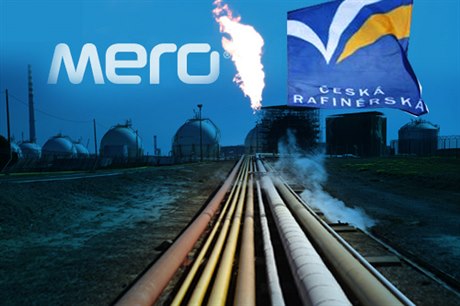The shareholders of the Transalpine Pipeline (TAL), which include several oil majors, last year decided to raise shipment tariffs. However, Česká rafinérská, the largest Czech recipient of oil via TAL, is refusing to pay its share of the higher tariffs to the Czech state-owned oil pipeline operator Mero, which negotiates all oil shipments via TAL on behalf of Czech customers and pays for the shipments up front.
Negotiations between Mero and Česká rafinérská on the payment of the refiner's arrears as a result of the TAL tariff hike and over a new contract for all deliveries are deadlocked. The last round of talks last week was reportedly very tense: “Česká rafinérská claims that we did not negotiate aggressively enough with the operator of TAL to get a lower tariff. But the reality is we pay the same tariff as the actual TAL shareholders, and we properly re-invoice this amount to Česká rafinérská,” Mero’s general director Jaroslav Pantůček told Czech Position.
Česká rafinérská is refusing to comment about the spat with Mero. The refiner — majority owned by Unipetrol, which in turn is controlled by PKN Orlen of Poland — owes Kč 1.8 million from January and its debt to Mero will rise by a similar amount each month as long as it receives similar size volume shipments from Trieste via the Transalpine Pipeline (TAL) and, subsequently, the Ingolstadt - Kralupy nad Vltavou – Litvínov (IKL) pipeline.
The TAL pipeline’s largest shareholders are Austria's OMV (25%), Shell (24%), Ruhr Oel, jointly owned by BP and Rosneft, (11%) Eni (10%), Petroplus (10%), and BP (9%). For the Czech Republic the TAL route acts as a strategic counterbalance to oil shipments from Russian and the CIS via the Duzhba pipeline. From 35 to 40 percent of the country’s oil supplies are now delivered via TAL and for a number of years now Mero has tried, so far unsuccessfully, to acquire a stake in the pipeline.
Protracted disagreements
Mero boss Pantůček says that if Česká rafinérská does not pay its debt stemming from the higher TAL tariffs, the Czech pipeline operator will have no choice but to launch arbitration proceedings against the Polish-controlled refiner. “Česká rafinérská is clearly in breach of contract, mutual negotiations have led nowhere, so now Mero must consider further steps, which could result in the launch of an arbitration suit against Česká rafinérská,” Pantůček said.
Relations between Mero and Česká rafinérská were strained even prior to the dispute over the TAL tariffs. At the end of 2009, the refiner announced that it was withdrawing from its contract with Mero for the shipment and storage of all its oil delivered to its main refineries in Litvínov and Kralupy nad Vltavou with the aim of gaining lower rates from the pipeline operator. Česká rafinérská argues that the contract signed in 1996 resulted in relatively high prices due to the costs incurred by Mero building the IKL pipeline (Mero is the owner of IKL) and that following the completion of the pipeline Mero’s rates are no longer justifiable.
With a termination period of three years following notice of cancellation, that contract runs down at the end of this year, but Česká rafinérská is no nearer to reaching a new agreement with Mero than it was in 2009, all the more so because of the TAL tariff dispute.
According to Czech Position’s information, the negotiations were further complicated following the departure of Česká rafinérská’s former head, Ivan Souček, in April 2011. He has been replaced by Marek Świtajewski from the refiner’s mother company, PKN Orlen, but since he took up the position Świtajewski has not attended any talks with Mero.
Czech Position attempted to find out how Česká rafinérská views the latest dispute and complicated state of relations with Mero and sent the company the following questions:
- Why is Česká rafinérská not fulfilling its contractual obligations towards Mero and is refusing to pay the higher tariffs for shipments via TAL?
- Why doesn’t the general manager of Česká rafinérská attend negotiations with Mero?
- How are the negotiations on a new contract with Mero for the shipment and storage of oil proceeding, given that the current contract from which Česká rafinérská withdrew is valid only until the end of this year?
Česká rafinérská’s spokesman Aleš Soukup refused to comment on the dispute. “As a matter of principle Česká rafinérská does not comment about on-going negotiations,” he wrote in response to the questions.
One intriguing circumstance about the whole dispute is the fact that two of Česká rafinérská’s three shareholders, Eni and Shell, have a stake in TAL, thus on the one hand they are among those who decided to raise the tariffs for TAL, and on the other, they along with PKN Orlen are refusing to pay the difference between the old and new rates on the grounds that the new tariffs are unjustifiably high.
New contract in doubt
At the end of 2009, Mero and Česká rafinérská issued a joint press release concerning the refiner’s notice of termination of the contract with Mero: “The company Česká rafinérská has announced that it is terminating its contract for the shipment and storage of oil. The contract became valid in 1996 for a minimum of 15 years with the option of cancellation as of 2008 with a three-year period of notice. The current contract and the conditions thereof will be valid through to 2012. The shipment and storage of oil by Mero for the company Česká rafinérská is in no way effected by the termination of the contract. Both companies will hold negotiations over the next three years to establish new contractual conditions which will be acceptable to both parties.”
Mero and Česká rafinérská have not, however, managed to agree on conditions acceptable to both sides and therefore, if they do not come to terms before the end of this year Mero will continue to store and deliver oil for the refiner under the conditions and rates set in the contract dating from 1996, which Česká rafinérská deems too high.





